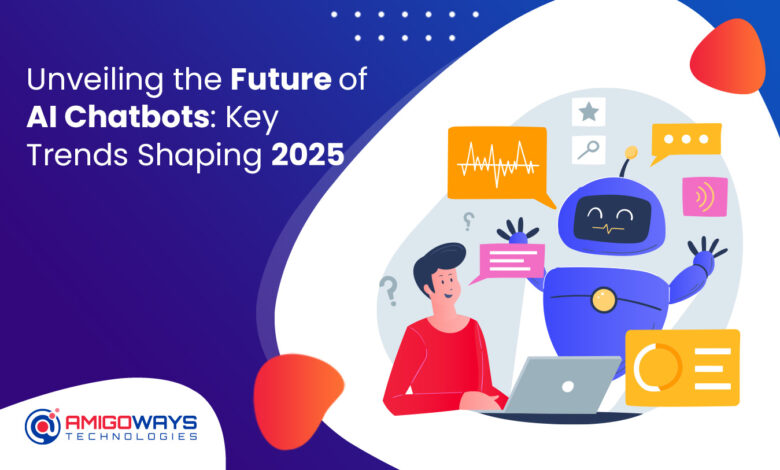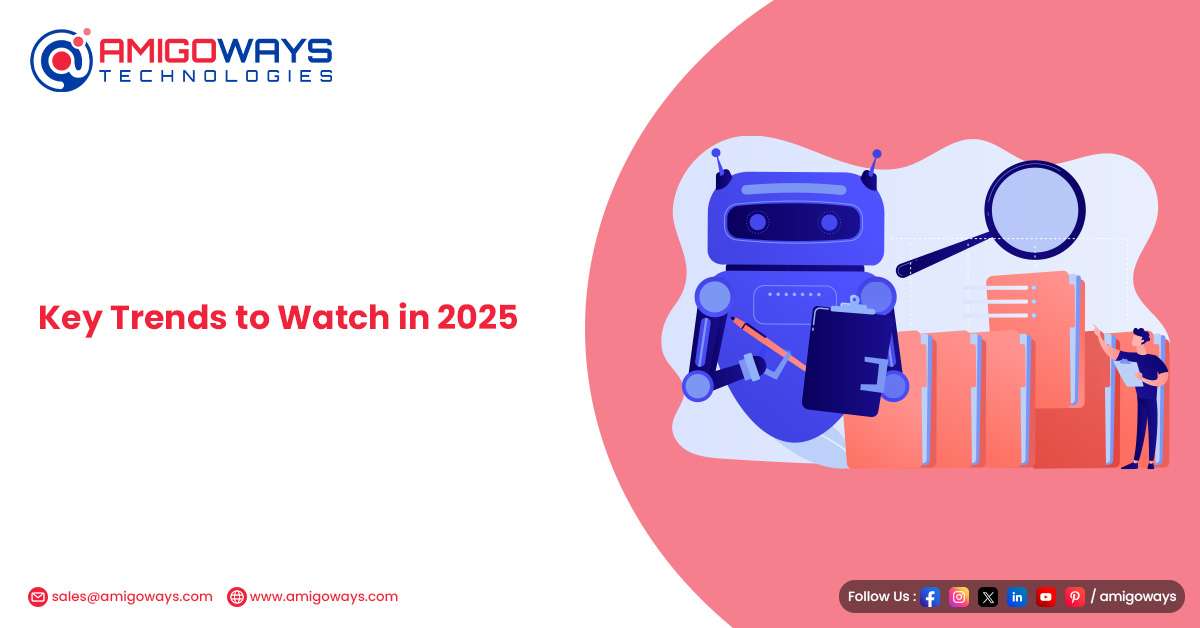Unveiling The Future Of AI Chatbots: Key Trends Shaping 2025 – Amigoways

In the dynamic landscape of technological innovation, AI chatbots stand at the forefront of revolutionizing customer engagement and operational efficiency. As we look ahead to 2025, the future of AI chatbots unveils a landscape shaped by transformative trends that redefine the way businesses interact with customers. From advancements in natural language processing to the integration of cutting-edge technologies, such as augmented reality, these key trends promise to unlock new possibilities and drive unprecedented growth. With the expertise of Amigoways guiding the way, let’s delve into the key trends shaping the future of AI chatbots in 2025.
Where Chatbots Are Used 2025?
In 2025, chatbots are expected to continue their widespread adoption across various industries, serving diverse purposes. Here’s how they are anticipated to be used:

- Customer Service: Chatbots will remain a crucial component of customer service strategies, providing immediate assistance and resolving inquiries efficiently. With advancements in natural language processing, chatbots will offer more personalized and contextually relevant responses, enhancing the overall customer experience.
- E-commerce: In the realm of e-commerce, chatbots will play a significant role in streamlining the shopping experience. They will assist customers in product searches, offer personalized recommendations, facilitate order tracking, and provide support throughout the purchasing process. Additionally, chatbots may leverage conversational commerce to enable transactions directly within messaging platforms.
- Healthcare: Chatbots are poised to revolutionize healthcare by offering round-the-clock support, appointment scheduling, medication reminders, and symptom assessment. They can also provide valuable health-related information and guide patients to appropriate resources. As healthcare chatbots become more sophisticated, they may even assist in remote patient monitoring and triage.
- Banking: Chatbots will continue to transform the banking sector by offering personalized financial advice, assisting with account management, processing transactions, and addressing customer inquiries. They will enhance the efficiency of banking operations and enable seamless interactions between customers and financial institutions through various digital channels.
- Education: In the field of education, chatbots will serve as virtual tutors, providing personalized learning experiences tailored to individual student needs. They can offer real-time assistance, answer questions, deliver educational content, and track student progress. Educational chatbots will facilitate interactive and engaging learning environments both inside and outside the classroom.
Optimization in these areas will involve refining chatbot algorithms to better understand user intent, improving natural language understanding capabilities, enhancing integration with existing systems, and ensuring compliance with industry-specific regulations. Additionally, optimizing the user interface and experience will be crucial for maximizing the effectiveness and adoption of chatbots across different industries.
Key Trends To Watch In 2025
In 2025, AI chatbots will redefine customer engagement with human-like interactions and integration with augmented reality, driving efficiency and innovation in businesses worldwide. Embrace these trends to stay ahead and unleash the full potential of AI-powered chatbots.

- Chatbots Become More Human-Like: As AI technologies advance, chatbots will become increasingly adept at mimicking human conversation patterns, including natural language understanding, tone, and even humor. This human-like interaction will enhance
user engagement and make interactions with chatbots more seamless and enjoyable. - Enhanced Conversations with NLP Advancements: Natural Language Processing (NLP) advancements will enable chatbots to better understand and respond to user queries, even in complex or ambiguous contexts. These advancements will lead to more fluid and contextually relevant conversations between users and chatbots.
- Personalized Responses from Chatbots: With the help of AI and machine learning algorithms, chatbots will deliver highly personalized responses tailored to individual user preferences, behaviors, and past interactions. This personalization will enhance the overall user experience and foster stronger relationships between users and brands.
- AI Chatbots in Contact Centers: AI-powered chatbots will play a central role in contact centers, handling a wide range of customer inquiries and support tasks autonomously. They will assist human agents by triaging inquiries, providing relevant information, and even resolving issues independently, leading to improved efficiency and customer satisfaction.
- Mainstream Use of Voice Chatbots: Voice-based chatbots, powered by technologies like speech recognition and natural language understanding, will become increasingly prevalent. Users will interact with chatbots using voice commands, enabling hands-free interactions and expanding the accessibility of chatbot services across different devices and platforms.
- Streamlined Payments with Chatbots: Chatbots will facilitate streamlined and frictionless payment experiences for users, allowing them to make purchases, transfer funds, and complete transactions directly within messaging platforms or chat interfaces. Integration with payment gateways and secure authentication methods will ensure smooth and secure transactions.
- Customer Experience Driving Chatbot Adoption: Organizations will prioritize the use of chatbots to enhance the overall customer experience, leveraging them to deliver personalized assistance, streamline processes, and provide round-the-clock support. Chatbots will become an essential tool for brands looking to differentiate themselves and build stronger customer relationships.
- Enhanced Security and Privacy: As chatbots handle sensitive user data and financial transactions, ensuring robust security and privacy measures will be paramount. Chatbot platforms will incorporate advanced encryption techniques, authentication protocols, and compliance standards to protect user information and uphold data privacy regulations.
- Integration with Augmented Reality (AR) and Virtual Reality (VR): Chatbots will increasingly integrate with AR and VR technologies to provide immersive and interactive experiences. For example, in the retail sector, AR-powered chatbots can assist customers in trying out virtual products before making a purchase, enhancing the online shopping experience.
- Multi-Language Support and Localization: With businesses operating on a global scale, chatbots will need to offer support for multiple languages and dialects to cater to diverse customer bases. Additionally, localization efforts will ensure that chatbots adapt to cultural nuances and regional preferences, further enhancing user engagement and satisfaction.
- Cross-Platform Integration: Chatbots will seamlessly integrate across multiple platforms and channels, including websites, social media platforms, messaging apps, and voice assistants. This omnichannel approach will enable consistent and cohesive interactions with users across their preferred communication channels, enhancing convenience and accessibility.
- Predictive Analytics and Personalized Recommendations: Chatbots will leverage predictive analytics and machine learning algorithms to anticipate user needs and deliver proactive recommendations. By analyzing user behavior, preferences, and purchase history, chatbots can offer tailored suggestions and promotions, driving sales and enhancing customer loyalty.
- Emotional Intelligence and Empathy: Advanced chatbots will possess emotional intelligence capabilities, allowing them to recognize and respond to user emotions effectively. By displaying empathy and understanding, chatbots can establish stronger connections with users, leading to increased trust and satisfaction.
- Continuous Learning and Improvement: Chatbots will undergo continuous learning and improvement through feedback loops and data analysis. By analyzing user interactions and refining their algorithms, chatbots can adapt to changing trends, preferences, and user expectations, ensuring ongoing relevance and effectiveness.
- Collaboration with Human Agents: While chatbots will handle a significant portion of customer interactions, they will also collaborate seamlessly with human agents when necessary. This hybrid approach allows organizations to leverage the efficiency of chatbots while providing personalized assistance and expertise from human representatives when needed.
These trends represent the continued evolution and maturation of chatbot technology, driving innovation and reshaping the way businesses engage with customers and deliver services. As chatbots become more sophisticated and ubiquitous, they will play an increasingly integral role in shaping the future of customer interactions and business operations.
Conclusion
The future of AI chatbots in 2025 is poised for groundbreaking advancements, driven by key trends that redefine customer engagement and operational efficiency. From the integration of augmented reality to the predictive analytics powering personalized experiences, these innovations promise to reshape how businesses interact with customers and streamline internal processes. By embracing these trends and harnessing the capabilities of AI-powered chatbots, organizations can stay ahead of the curve, delivering exceptional experiences and driving growth in the digital era. As we anticipate the unfolding of these trends, one thing remains clear with the expertise of Amigoways, AI chatbots will continue to play a pivotal role in shaping the future of business interactions and paving the way for transformative opportunities in 2025 and beyond.
This article is originally Published by –https://www.amigoways.com/blog/unveiling-the-future-of-ai-chatbots-key-trends-shaping-2025/



